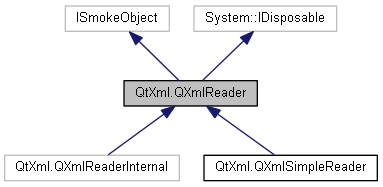|
Qyoto
4.0.5
Qyoto is a C# language binding for Qt
|
|
Qyoto
4.0.5
Qyoto is a C# language binding for Qt
|
The QXmlReader class provides an interface for XML readers (i.e. parsers). More...


Public Member Functions | |
| QXmlReader () | |
| QXmlReader (QXmlReader copy) | |
| virtual void | CreateProxy () |
| new bool | Feature (string name) |
| | |
| abstract bool | Feature (string name, ref bool ok) |
| | |
| abstract bool | HasFeature (string name) |
| | |
| abstract bool | HasProperty (string name) |
| | |
| abstract bool | Parse (QXmlInputSource input) |
| | |
| abstract void | SetFeature (string name, bool value) |
| | |
| new void | Dispose () |
Protected Member Functions | |
| QXmlReader (System.Type dummy) | |
Protected Attributes | |
| SmokeInvocation | interceptor |
Properties | |
| abstract QXmlContentHandler | ContentHandler [get, set] |
| | |
| abstract IQXmlDTDHandler | DTDHandler [get, set] |
| | |
| abstract IQXmlDeclHandler | DeclHandler [get, set] |
| | |
| abstract IQXmlEntityResolver | EntityResolver [get, set] |
| | |
| abstract IQXmlErrorHandler | ErrorHandler [get, set] |
| | |
| abstract IQXmlLexicalHandler | LexicalHandler [get, set] |
| | |
| virtual System.IntPtr | SmokeObject [get, set] |
The QXmlReader class provides an interface for XML readers (i.e. parsers).
This abstract class provides an interface for all of Qt's XML readers. Currently there is only one implementation of a reader included in Qt's XML module: QXmlSimpleReader. In future releases there might be more readers with different properties available (e.g. a validating parser).
The design of the XML classes follows the SAX2 Java interface, with the names adapted to fit Qt naming conventions. It should be very easy for anybody who has worked with SAX2 to get started with the Qt XML classes.
All readers use the class QXmlInputSource to read the input document. Since you are normally interested in particular content in the XML document, the reader reports the content through special handler classes (QXmlDTDHandler, QXmlDeclHandler, QXmlContentHandler, QXmlEntityResolver, QXmlErrorHandler and QXmlLexicalHandler), which you must subclass, if you want to process the contents.
Since the handler classes only describe interfaces you must implement all the functions. We provide the QXmlDefaultHandler class to make this easier: it implements a default behavior (do nothing) for all functions, so you can subclass it and just implement the functions you are interested in.
Features and properties of the reader can be set with setFeature() and setProperty() respectively. You can set the reader to use your own subclasses with setEntityResolver(), setDTDHandler(), setContentHandler(), setErrorHandler(), setLexicalHandler() and setDeclHandler(). The parse itself is started with a call to parse().
See also QXmlSimpleReader.
|
protected |
| QtXml.QXmlReader.QXmlReader | ( | ) |
| QtXml.QXmlReader.QXmlReader | ( | QXmlReader | copy | ) |
|
virtual |
Reimplemented in QtXml.QXmlSimpleReader.
| new void QtXml.QXmlReader.Dispose | ( | ) |
| new bool QtXml.QXmlReader.Feature | ( | string | name | ) |
If the reader has the feature called name, the feature's value is returned. If no such feature exists the return value is undefined.
If ok is not 0: *ok is set to true if the reader has the feature called name; otherwise *ok is set to false.
See also setFeature() and hasFeature().
|
pure virtual |
If the reader has the feature called name, the feature's value is returned. If no such feature exists the return value is undefined.
If ok is not 0: *ok is set to true if the reader has the feature called name; otherwise *ok is set to false.
See also setFeature() and hasFeature().
Implemented in QtXml.QXmlSimpleReader.
|
pure virtual |
Returns true if the reader has the feature called name; otherwise returns false.
See also feature() and setFeature().
Implemented in QtXml.QXmlSimpleReader.
|
pure virtual |
Returns true if the reader has the property name; otherwise returns false.
See also property() and setProperty().
Implemented in QtXml.QXmlSimpleReader.
|
pure virtual |
Reads an XML document from input and parses it. Returns true if the parsing was successful; otherwise returns false.
Implemented in QtXml.QXmlSimpleReader.
|
pure virtual |
Sets the feature called name to the given value. If the reader doesn't have the feature nothing happens.
See also feature() and hasFeature().
Implemented in QtXml.QXmlSimpleReader.
|
protected |
|
getset |
Returns the content handler or 0 if none was set.
Sets the content handler to handler.
|
getset |
Returns the declaration handler or 0 if none was set.
Sets the declaration handler to handler.
|
getset |
Returns the DTD handler or 0 if none was set.
Sets the DTD handler to handler.
|
getset |
Returns the entity resolver or 0 if none was set.
Sets the entity resolver to handler.
|
getset |
Returns the error handler or 0 if none is set.
Sets the error handler to handler. Clears the error handler if handler is 0.
|
getset |
Returns the lexical handler or 0 if none was set.
Sets the lexical handler to handler.
|
getset |